Key takeaways:
- Political blogging allows individuals to share insights and foster community engagement while balancing personal opinion with accurate information.
- Audio news aggregators enhance information consumption by providing diverse perspectives and making content accessible in various formats.
- Effective political blogging involves presenting balanced perspectives, engaging with the audience, and using storytelling to connect emotionally with readers.
- Authenticity, thorough research, and reader engagement are crucial for building trust and credibility in the blogging journey.
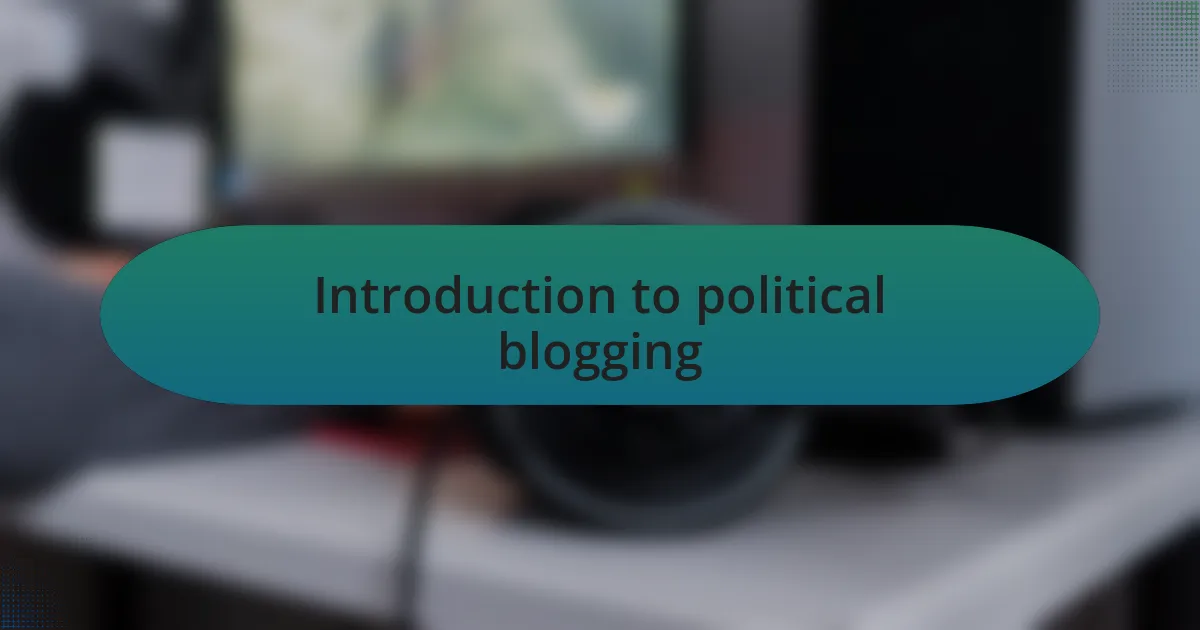
Introduction to political blogging
Political blogging has emerged as a powerful platform for individuals to share their thoughts, insights, and critiques about the political landscape. I remember when I first stumbled into this world, feeling a rush of excitement as I realized my voice could contribute to larger conversations. Could my opinions resonate with others? It was a thrilling thought that made me eager to dive deeper.
Engaging with political topics online fosters a unique sense of community. I often find myself connecting with readers who share similar passions or, conversely, those who challenge my viewpoints. This back-and-forth not only enriches my understanding but also sharpens my arguments. Isn’t it fascinating how a simple blog post can ignite spirited debates and inspire action among readers?
As I navigated my early days in political blogging, I quickly recognized the responsibility that comes with it. Every opinion I expressed could influence someone’s perspective or spur them to engage more actively in politics. That realization made me more mindful of the research I conducted and the sources I cited. How do we balance personal opinion with accurate information in a space where so many voices compete? It’s a question that continues to guide my writing journey.
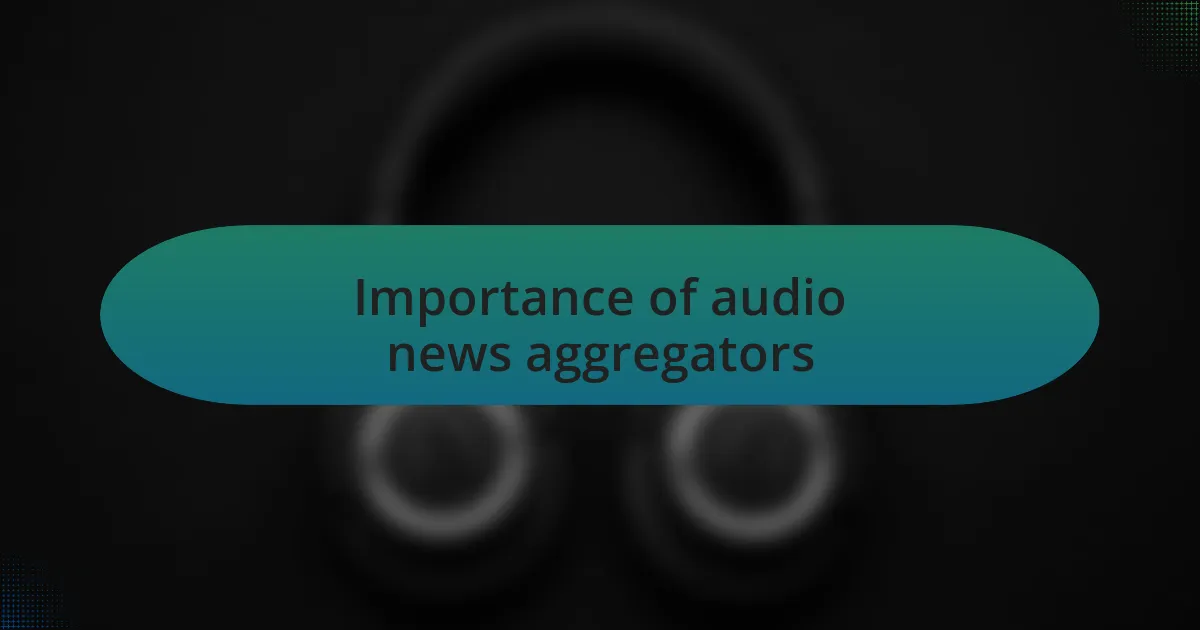
Importance of audio news aggregators
Audio news aggregators play a vital role in shaping how we consume information today. I can recall the first time I used one; it felt like opening a treasure chest of diverse perspectives at my fingertips. The accessibility of audio content transforms the way I stay informed, allowing me to absorb the news while multitasking – whether I’m cooking or commuting. How refreshing is it to engage with stories through the human voice instead of just text?
These platforms also promote inclusivity, offering content in various formats that cater to different learning styles. I often find myself drawn to podcasts that delve into political matters in a way that feels more like a conversation than a lecture. Isn’t it easier to connect with an issue when you hear someone passionately discussing it? This element of storytelling in audio formats can spark deeper emotional connections and encourage listeners to explore subjects they’ve never considered before.
Moreover, audio news aggregators can help combat the overwhelming noise of information overload. I remember feeling daunted by the sheer volume of articles I encountered daily until I found trusted audio sources that distilled complex topics into digestible segments. This curation allows me to focus on quality content, fostering a more profound understanding and engagement with critical political issues. How can we underestimate the power of a well-narrated story to inspire action and drive informed discussions?
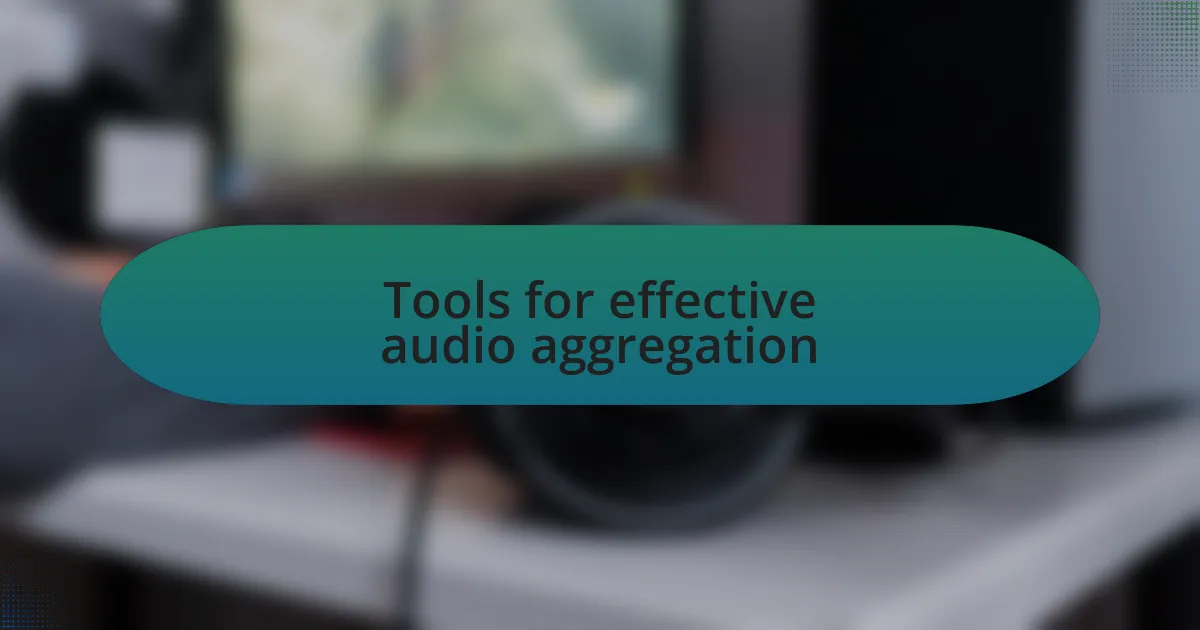
Tools for effective audio aggregation
Finding the right tools for effective audio aggregation can significantly enhance the listening experience. I recall switching to a particular app that allowed me to customize feeds based on my political interests. It felt like having a personal curator sift through the noise to deliver exactly what I wanted to hear, which made my daily listening routine feel more purposeful.
Another tool I’ve found invaluable is speech-to-text software. It’s remarkable how quickly I can jot down compelling quotes or ideas from audio content. I often pause an intriguing segment, transcribe it, and add it to my notes, which fosters deeper engagement. Isn’t it exciting how technology can empower us to interact more dynamically with the information we consume?
Lastly, using audio editing software to create highlight reels from lengthy podcasts can be a game changer. I remember piecing together important moments from a political debate, which allowed me to revisit essential arguments without wading through the entire episode. This practice not only aids comprehension but also encourages thoughtful sharing with others who might not have time to listen to the whole thing. How often do we wish we could distill the most critical parts for easier discussion or reflection?
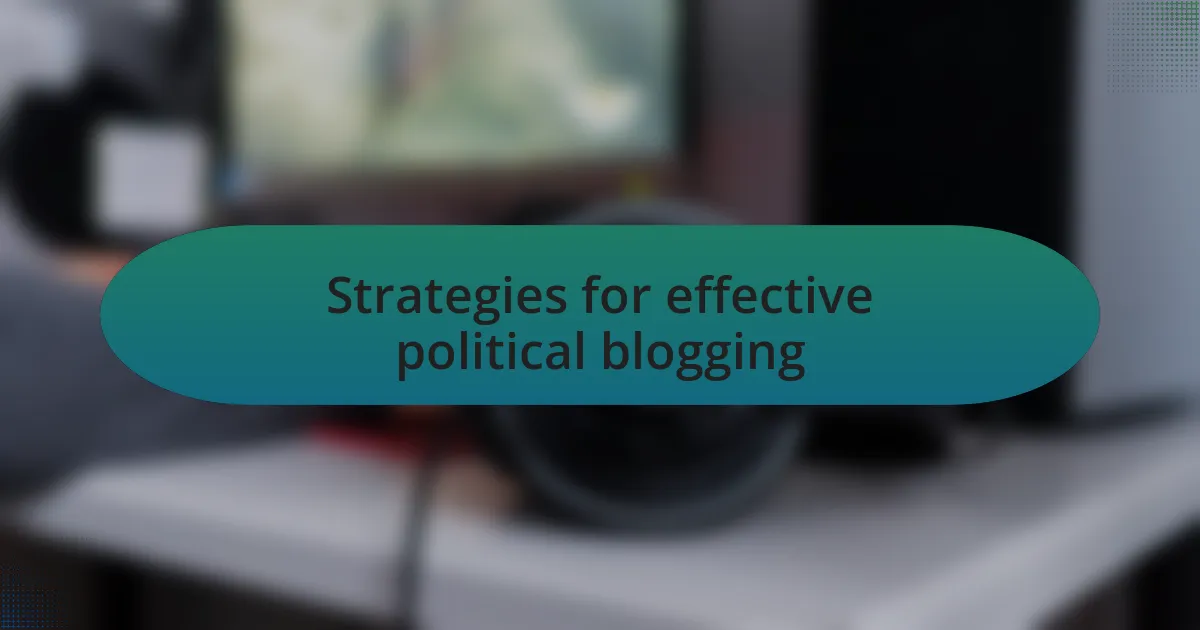
Strategies for effective political blogging
One effective strategy for political blogging is to present balanced perspectives. I’ve found that addressing different sides of an issue not only enriches the content but also builds credibility with my audience. When I wrote about a divisive policy, I made it a point to include arguments from both proponents and opponents. This inclusion fostered a sense of trust, as readers appreciated the fairness, even if they didn’t agree with all viewpoints.
Engaging with the audience is another crucial element for success in political blogging. When I opened a blog post with a thought-provoking question, I noticed a significant uptick in comments and social media shares. It’s almost as if inviting the reader to think critically alongside me transformed the piece from a monologue into a vibrant conversation. Have you ever experienced that moment when a reader’s response sparks a new idea in you? I certainly have, and it’s those interactions that often lead to the most meaningful content.
Finally, storytelling can weave powerful connections within political narratives. I recall sharing a personal experience related to a policy change affecting my community. Capturing my emotions during that time resonated with readers, making abstract concepts more tangible. Don’t you think stories have a unique strength in illustrating complex issues? They can elevate discussions beyond statistics, allowing the audience to feel the real impact behind the political dialogue.
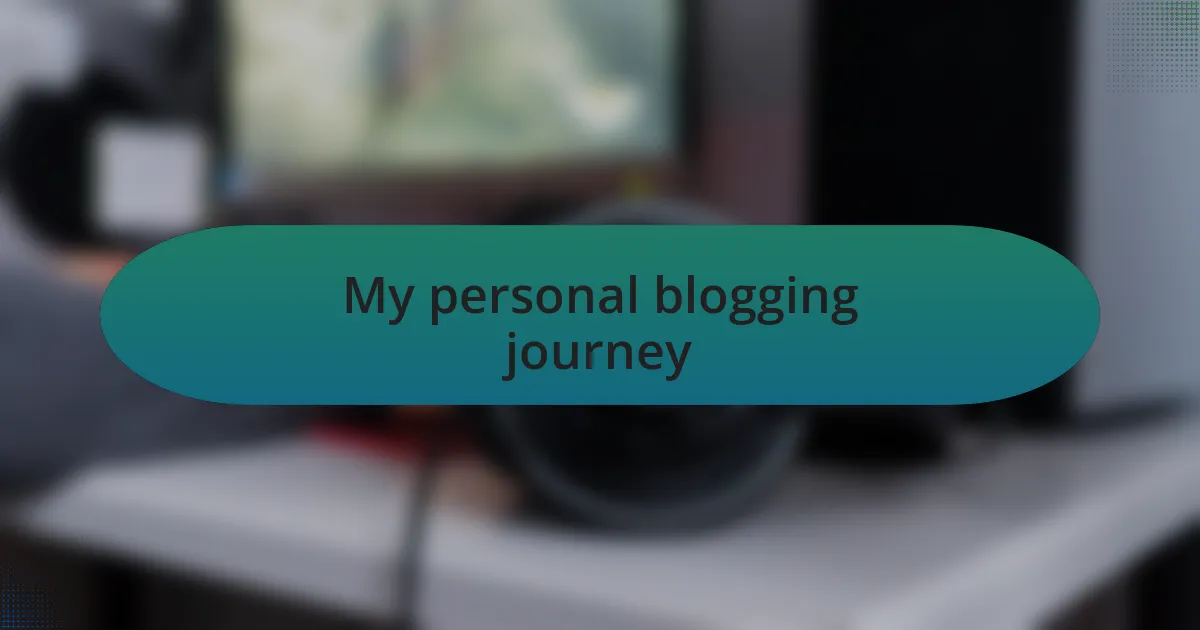
My personal blogging journey
My journey into political blogging began almost by accident. I was initially just sharing my thoughts on Twitter, and then I realized that I had a lot more to say. The first time I published a full post, I felt a mix of excitement and anxiety. Would people resonate with my words? That question lingered in my mind as I hit ‘publish’ for the first time.
As I delved deeper into the political landscape, I started seeing blogging as a way to not only express my views but also connect with others. I remember writing about a local election and feeling the weight of my responsibility to inform voters. It struck me that my words had the potential to influence opinions and decisions. Have you ever felt that rush when you know your voice matters? That realization propelled me to refine my writing and strive for accuracy, balancing my passion with a commitment to truth.
Over time, I’ve grown more comfortable sharing my perspective, even when it feels daunting. I recall a particularly challenging piece where I tackled a controversial policy. The fear of backlash was palpable, yet I felt compelled to share my thoughts. When I finally published it, a wave of supportive comments poured in. It was a reminder that vulnerability in blogging could foster real connection, and I’ve cherished these moments as affirmations of why I started this journey in the first place. Don’t you think that sharing our struggles can inspire others to open up too?
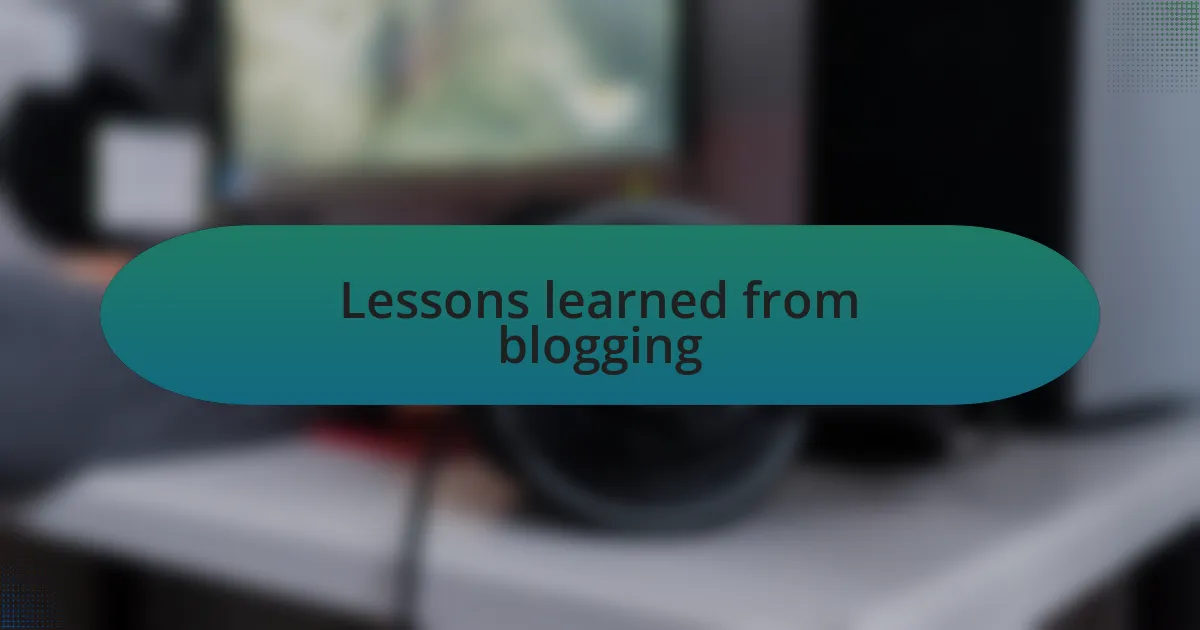
Lessons learned from blogging
One significant lesson I’ve learned from blogging is the importance of authenticity. Early on, I tried to imitate styles that I thought would attract more readers, but it felt disingenuous. Once I embraced my true voice, my posts resonated more with my audience. Have you had a moment where being yourself made all the difference?
Another valuable insight has been the necessity of research. In my early days, I sometimes rushed to share opinions without thoroughly vetting my sources. I didn’t realize that unfounded statements could erode trust with my readers. I remember debating a crucial issue and later discovering a critical fact I had overlooked, which led me to publish a follow-up post correcting my mistake. That experience stressed how vital it is to uphold credibility in the blogging realm. How can we expect our readers to trust us if we don’t hold ourselves to a standard of accuracy?
Finally, engaging with readers has proven to be a cornerstone of my blogging journey. I’ve found that responding to comments and initiating discussions enriches both my understanding and the community we build. Each interaction serves as a reminder that blogging is not just about sharing opinions, but also about fostering dialogues. Isn’t it fascinating how a simple comment can spark a heartfelt conversation?